Local
Mayoral candidates march in Pride Parade
Pro-LGBT rivals highlight tough choice for activists in race
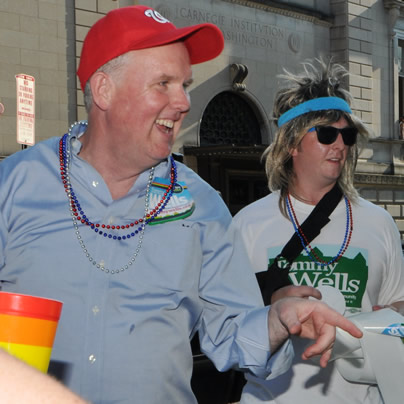
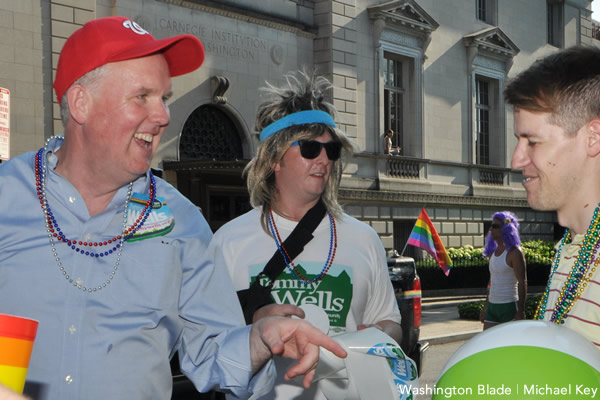
D.C. Council members Muriel Bowser (D-Ward 4), Tommy Wells (D-Ward 6) (on left), and Jack Evans (D-Ward 2) all marched in Saturday’s Pride parade. (Washington Blade photo by Michael Key)
D.C. Council members Muriel Bowser (D-Ward 4), Tommy Wells (D-Ward 6), and Jack Evans (D-Ward 2) – each of whom is running for mayor – waved to thousands of cheering onlookers on Saturday as they marched in D.C.’s Capital Pride Parade.
Mayor Vincent Gray, who has yet to announce whether he will run for a second term but who many believe will throw his hat in the ring, also marched in the parade, with LGBT supporters and city employees marching in his contingent.
The fact that four prominent politicians and long-time LGBT allies are either running or expected to run for mayor in the April 2014 Democratic mayoral primary highlights what many activists say is D.C.’s status as one of America’s most LGBT supportive cities.
But for many in the LGBT community, the fact that four longtime friends are running or likely to run against each other poses a dilemma. On what basis will they choose one over the other, some are asking.
In interviews with the Washington Blade during LGBT Pride month, several activists who discussed the upcoming mayoral election said it is far too early to make a decision on whom to back, even among those who supported Gray in his 2010 mayoral election campaign.
“We don’t know who else will get in the race,” said gay Democratic activist Peter Rosenstein, who supported Gray in 2010 and who has written several commentaries for the Blade praising Gray’s administration for making important improvements in the city, including the local economy.
“It’s much too early to make a decision,” Rosenstein said.
Veteran gay and AIDS activist Cornelius Baker, however, said he remains a strong Gray supporter and he and many others in the LGBT community he knows won’t line up behind anyone else until Gray makes his intentions known.
“We’re all waiting for him to give us the word that he’s running,” said Baker at a Black LGBT Pride event two weeks ago. “I’m ready to do all I can to support him because he’s done an excellent job on the issues that are important to me.”
Rick Rosendall, president of the Gay and Lesbian Activists Alliance, a non-partisan advocacy group that rates candidates based on their record and positions on LGBT-related issues, expressed caution about basing a decision on who to back solely on a candidate’s general statements of support.
“All friends are not created equal,” he said. “It behooves us to look inside the wrappers and compare the candidates’ records on translating their friendly words into results,” said Rosendall. “But that’s for another day – it’s Pride, and we have much to celebrate.”
Rosendall backed Gray in the 2010 election.
Christopher Dyer, who served as director of the city’s Office of GLBT Affairs under Mayor Adrian Fenty, said he’s supporting Bowser, who was a strong Fenty supporter in the 2010 election in which Gray beat Fenty in a hotly contested race.
Also backing Bowser is gay activist and businessman Everett Hamilton.
If Fenty’s LGBT backers transfer their support to Bowser, who was a strong political ally of Fenty’s, the Ward 4 Council woman could receive a considerable boost for her campaign among LGBT voters. Fenty won in most of the city’s election precincts with high concentrations of LGBT residents in his unsuccessful bid for a second term in 2010.
Gay Democratic activist John Fanning said he is among the Ward 2 LGBT residents supporting Evans in the mayoral election next year.
“Jack has the experience and has paid his dues,” said Fanning, noting that Evans has been on the D.C. Council since 1991.
Mark Lee, an advocate for nightlife businesses and a business columnist for the Blade, said the mayoral contenders’ strong record of support on LGBT issues opens the way for LGBT voters to look at other issues.
“The hard work by community leaders over many years has made LGBT issues non-controversial in District politics or governance,” Lee said. “As a result, we now have both the opportunity and obligation to participate as full citizens and evaluate candidates on a wide range of issues.”
In media interviews during the past few weeks, each of the three Council contenders in the mayor’s race as well as Gray have said they welcome voter scrutiny of their positions and records on all issues.
Meanwhile, at least two others have given hints that they were considering entering the race. Gay D.C. Council member David Catania (I-At-Large) reportedly is weighing a run, according to political insiders. Should he run and win, Catania would make history by becoming the first out gay person elected mayor of D.C.
Robert C. Bobb, who served as city administrator under former D.C. Mayor Anthony Williams and later as president of the D.C. school board, is also said to be considering a run for mayor next year. Bobb expressed support for LGBT rights during his campaign for the school board post in 2006 as well as during his tenure as city administrator.
Catania, a longtime vocal supporter of LGBT rights, was the author and lead advocate for the city’s same-sex marriage law, which the D.C. Council passed in 2009. He recently switched from serving as chair of the Council’s Committee on Health to being chair of the Committee on Education, where he has emerged as a vocal advocate for school reform.
Evans, Bowser and Wells each voted for the marriage equality law after advocating for such legislation since winning election to the Council.
“I intend to spend more time focused on that, and when and if I decide to do something else I’ll make that decision, but it’s hard to do two tracks,” Catania told the Blade while marching in the Capital Pride Parade on Saturday. “People often make calculations that are not thoughtful and I want to postpone that campaign mode as long as possible,” he said.
Michael K. Lavers contributed to this report.
Maryland
Silver Spring holds annual Pride In The Plaza
‘Today means inclusion. It means to build resilience’

Silver Spring’s annual Pride in the Plaza event took place on Sunday to celebrate the LGBTQ community and emphasize inclusion and resilience.
“Today means inclusion. It means to build resilience, love,” Robyn Woods, program and outreach director for Live In Your Truth, which organized the event, said. “I mean, just being surrounded by the community and so many great entrepreneurs, business owners, and just being a part of this whole rainbow coalition that we call the LGBTQIA to be about.”
With the event being her first time organizing for Live In Your Truth, Woods said she felt emotional to see the support and love at the event.
“Some people (are) bringing out their children, their babies, their grandparents,” Woods said. “It’s a lot more allies here than anything else. That type of support to me means so much more than just support from my community; just outside support, inside support, so much support around it, so much love. Everyone’s smiling outside, helping each other.”
Attendees of the event were able to head over to the Family Fun Zone, an air-conditioned Pride Cool Down Lounge, or watch live drag performances in the main stage area.
Along with entertainment and a shaved-ice stand, rows of information tables stood along the plaza, including FreeState Justice, the Washington Spirit, Trans Maryland, Moco Pride Center, and the Heartwood Program, an organization that offers support, therapy, education, and resources to the LGBTQ community.
“I want people to know about our services, and I love what we have to offer,” Jessica Simon, psychotherapist for Heartwood Program’s Gender Wellness Clinic, said. “I (also) want to be part of a celebration with the community, and so it feels good to be here with other people who have something they want to give to the community.”
She added that within today’s political climate, to which she called an “antidote to shame,” it’s important to be celebrating Pride.
“There’s a lot of demonization of LGBTQI people,” Siena Iacuvazzi, facilitator for Maryland Trans Unity, said. “(Pride) is part of the healing process.”
Iacuvazzi said she was taught to be ashamed of who she was growing up, but being a part of a community helped her flourish in the future.
“I was taught how to hate myself. I was taught that I was an abomination to God,” she said. “But being a community is like understanding that there are people who have experienced the same thing, and they’re flourishing. They’re flourishing because they’re willing to stand up for themselves as human beings and discover themselves and understand what’s true for themselves.”
She added that Pride allows for a mutual understanding to take place.
“It’s more of a sense of belonging … and just taking that home and understanding you’re not alone,” Iacuvazzi said. “We’re each taking our own journey — we’re not putting that on each other. It’s just walking away with a sense of belonging and humanity.”
Similar to Iacuvazzi, Woods said she hopes attendees’ biggest takeaways would be family, fun, resilience, and pride.
“Being proud of yourself, being happy for who you are, and representation and how much it matters,” she continued. “And I think all these young people that are walking around here get to see versions of themselves, but older. They get to see so many different lesbian, gay, bisexual, pansexual people that are successful, that are showing love, that care, and it’s not how we’re portrayed in the media. It’s lovely to see it out here. (It’s) like we’re one big old, happy family.”
Virginia
Spanberger touts equality, reproductive rights in Arlington
Democratic Va. gubernatorial nominee made campaign stop at Freddie’s Beach Bar
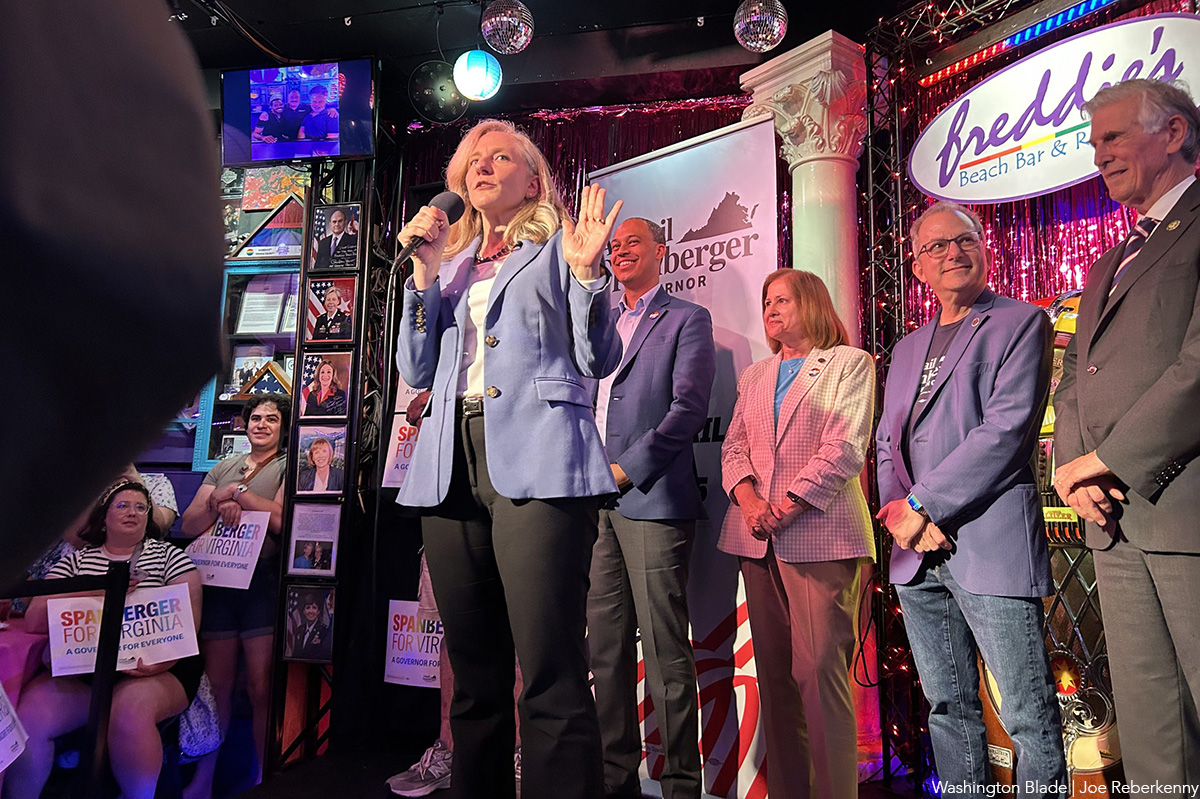
With the general election heating up and LGBTQ rights under increasing threat nationwide, Virginia gubernatorial candidate Abigail Spanberger brought her “Span Virginia Bus Tour” to Arlington’s Freddie’s Beach Bar for a campaign stop filled with cheers, policy pledges, and community spirit.
Spanberger, who served three terms in the U.S. House of Representatives from 2019 through early 2025 for Virginia’s 7th Congressional District, also served as a federal law enforcement officer specializing in narcotics and money laundering cases, and as a CIA case officer working on counterterrorism and nuclear counterproliferation.
Spanberger is running against Republican nominee Winsome Earle-Sears, the current lieutenant governor of Virginia, who said she was “morally opposed” to a bill protecting marriage equality in the commonwealth.
She was joined by other Democratic candidates and supporters: lieutenant gubernatorial candidate Ghazala Hashmi, attorney general candidate Jay Jones, Virginia state Sen. Adam Ebbin (D-Alexandria), and Congressman Don Beyer.
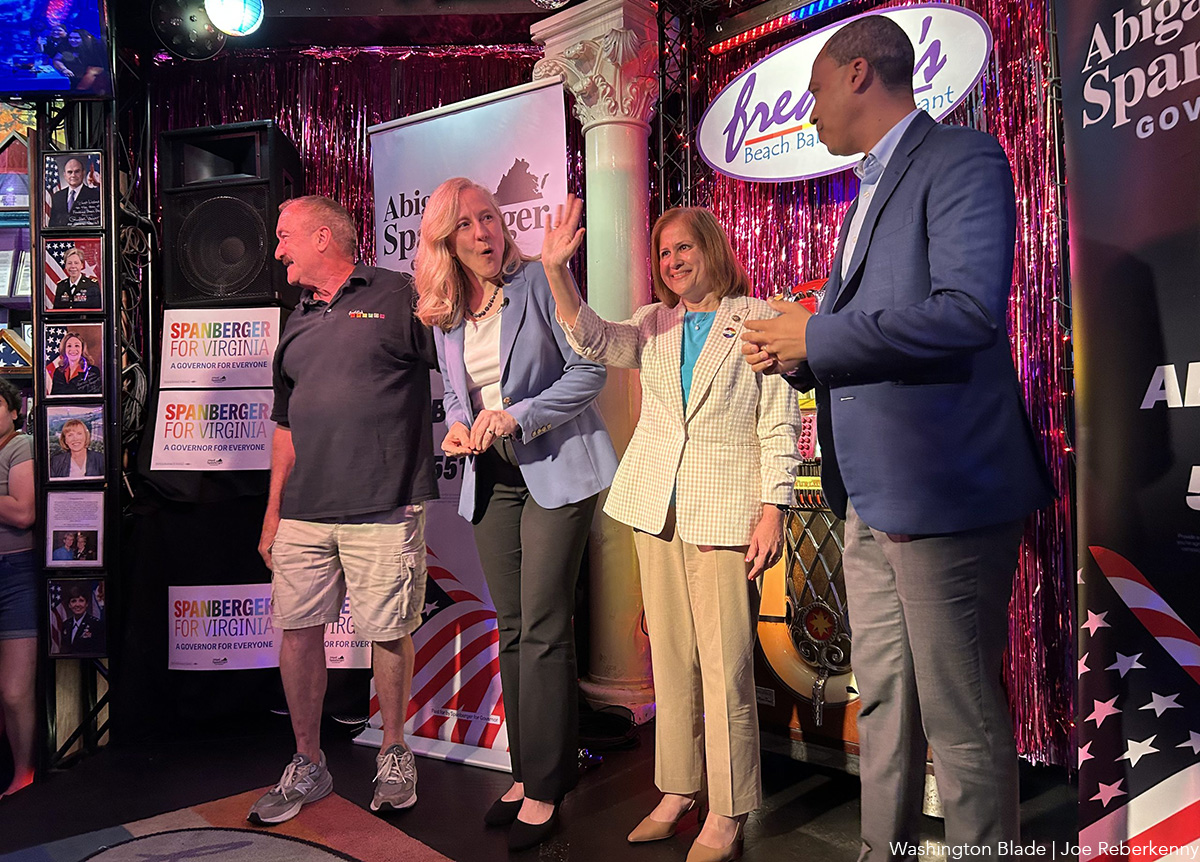
Freddie’s was packed wall-to-wall with supporters, many of whom wore “Spanberger for Virginia” shirts in the progressive Pride flag colors. In her speech, she made it clear that LGBTQ Virginians’ rights are on the ballot this year.
“I’m so excited to be here, and I am so grateful to the entire staff of Freddy’s for letting us overtake this incredible venue that is not just an awesome place to come together in community, but is a symbol to so many people of joy, of happiness, of community and of celebrating our friends and our neighbors,” Spanberger told the packed restaurant. “It is exciting to be here, and particularly during this Pride month, and particularly as we reflect on the 10-year anniversary of Obergefell and the reality that we still have so much work to do.”
“The reality is there are so many people who still would be inclined to take us backwards,” she said. “In this moment when we see attacks on people’s rights, on people’s humanity, on Virginia, on our economy, on research, on public education, on food security, on health care, on Virginians, on their jobs, on public service and on people — it can get heavy.”
“What it does for me is it makes me want to double down, because once upon a time, when I was talking to my mother about some horror show or sequence of activities coming out of a particular administration, she did not really have the patience to listen to me and said ‘Abigail, let your rage fuel you’ — and the conversation was over. And so I reflect on that, because, in fact, every day there is so much fuel to be had in this world and in this moment.”
One of the points Spanberger continued to emphasize was the importance of steadfast state government officials following the election of President Donald Trump, which has led to rollbacks of LGBTQ and bodily autonomy rights as a result of the conservative-majority U.S. Supreme Court.
“What the past few years have shown us is that a Supreme Court decision, no matter how many years we have celebrated its existence, does not protect us in the long term. And so as governor, I will work to make sure that every protection we can put in place for the dignity, the value, and the equal rights of all Virginians is a priority.”
During her speech, Spanberger highlighted several of the key values driving her campaign — protecting reproductive freedom and human rights, lowering healthcare costs, safeguarding Virginia’s environment, and ensuring that public education is affordable, accessible, and rooted in truth, not politics.
Spanberger went as far as to say that she wants to amend the state’s constitution to remove Section 15-A. “The reality is that in Virginia, we still have a ban in our state constitution on marriage equality. It is of the utmost urgency that we move forward with our constitutional amendment.”
“We will work to ensure that that terrible constitutional amendment, that was put in years ago, is taken out and updated and ensuring that Virginia is reflective in our most essential documents of who we are as a commonwealth, which is an accepting place that celebrates the vibrancy of every single person and recognizes that all Virginians have a place, both in that constitution and in law,” she added.
Following the event, two supporters spoke to the Washington Blade about why they had come out to support Spanberger.
“I came out because I needed to show support for this ticket, because it has been a particularly rough week, but a long few years for our rights in this country, in this state, with this governor, and it’s — we need to flip it around, because queer people need protection,” said Samantha Perez, who lives in Ballston. “Trans people need protection. Trans kids need protection. And it’s not gonna happen with who’s in Richmond right now, and we just need to get it turned around.”
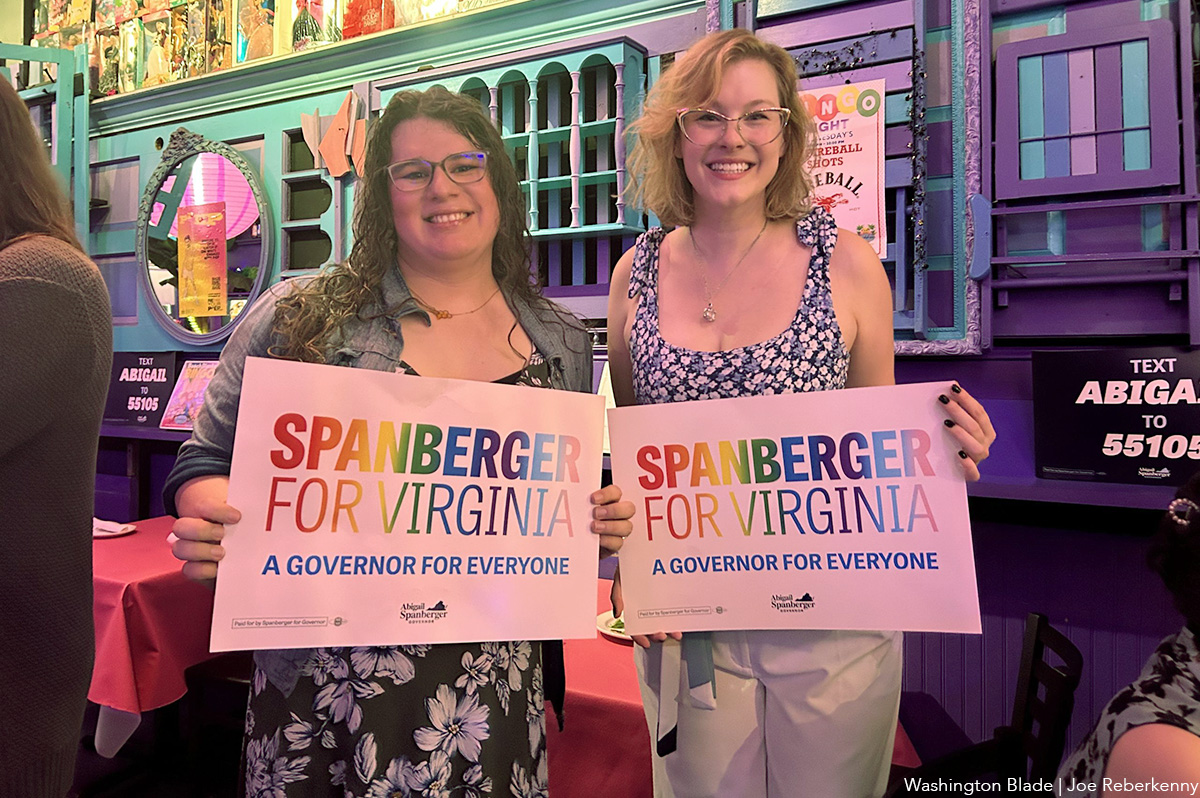
“The whole neighborhood’s here. All our friends are here,” said Annie Styles of Pentagon City. “It means the world to me to take care of each other. That’s what a good community does. That’s not what we’ve had with the Republicans here or across the nation for a really long time. It’s time to show that care. It’s time to make sure that good people are in a position to do good things.”
District of Columbia
Activists protest outside Hungarian Embassy in DC
Budapest Pride scheduled to take place Saturday, despite ban

More than two dozen activists gathered in front of the Hungarian Embassy in D.C. on Friday to protest the country’s ban on Budapest Pride and other LGBTQ-specific events.
Amnesty International USA Executive Director Paul O’Brien read a letter that Dávid Vig, executive director of Amnesty International Hungary, wrote.
“For 30 years Budapest Pride has been a celebration of hope, courage, and love,” said Vig in the letter that O’Brien read. “Each march through the streets of Budapest has been a powerful testament to the resilience of those who dare to demand equality, but a new law threatens to erase Pride and silence everyone who demands equal rights for LGBTI people.”
“The Hungarian government’s relentless campaign against LGBTI rights represents a worrying trend that can spread normalizing division and hatred,” added Vig. “Thank you for standing with us when we refuse to be intimidated.”
Council for Global Equality Chair Mark Bromley and two of his colleagues — Stephen Leonelli and Keifer Buckingham — also spoke. Health GAP Executive Director Asia Russell and Chloe Schwenke, a political appointee in the Obama-Biden administration who worked for the U.S. Agency for International Development, and Planned Parenthood staffers are among those who attended the protest.
(Washington Blade video by Michael K. Lavers)
Hungarian lawmakers in March passed a bill that bans Pride events and allow authorities to use facial recognition technology to identify those who participate in them. MPs in April amended the Hungarian constitution to ban public LGBTQ events.
Budapest Pride is scheduled to take place on Saturday, despite the ban. Hundreds of European lawmakers are expected to participate.
“Sending strength to the patriotic Hungarians marching tomorrow to advance human dignity and fundamental rights in a country they love,” said David Pressman, the gay former U.S. Ambassador to Hungary, on Friday on social media.
Sending strength to the patriotic Hungarians marching tomorrow to advance human dignity and fundamental rights in a country they love. Szabadság és szerelem. My past remarks on Budapest Pride: https://t.co/y1QhA9QouA
— David Pressman (@AmbPressman) June 27, 2025
-

 U.S. Supreme Court3 days ago
U.S. Supreme Court3 days agoSupreme Court upholds ACA rule that makes PrEP, other preventative care free
-

 U.S. Supreme Court4 days ago
U.S. Supreme Court4 days agoSupreme Court rules parents must have option to opt children out of LGBTQ-specific lessons
-

 National5 days ago
National5 days agoEvan Wolfson on the 10-year legacy of marriage equality
-

 Congress4 days ago
Congress4 days agoSenate parliamentarian orders removal of gender-affirming care ban from GOP reconciliation bill












